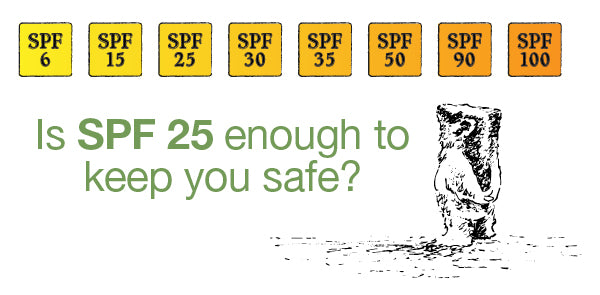SPF 25: is it enough to keep you safe?
At one time or another, we’ve all stood in the sunscreen aisle scratching our head. Traditionally, higher numbers are better in life – like bowling scores. So although you reach for the SPF 25, you might still get the urge to reach for an SPF 100. After all, if SPF 25 is good, shouldn’t SPF 100 be better?
Not exactly.
You’ve probably heard that SPF (Sun Protection Factor) operates by its own set of rules. And unfortunately for us, the SPF scale is not linear. Meaning, it doesn’t operate in a straight line and higher numbers don’t automatically mean more protection.
For example, SPF 100 is not actually twice as strong as SPF 50. In fact, anything above SPF 30 provides very little additional protection.
-
SPF 15 blocks 93% of UVB rays
- SPF 25 blocks 96% of UVB rays
- SPF 30 blocks 97% of UVB rays
- SPF 50 blocks 98% of UVB rays
To complicate things further, the non-linear nature of SPF goes both ways. If you apply only half the recommended amount of sunscreen, you don’t get half the protection. You get the square root of the SPF. So half the application of SPF 30 isn’t SPF 15, it’s SPF 6.
Is your head spinning yet? Mine too. So here’s a quick and easy guide to understanding SPF so you have time to concentrate on increasing your bowling score.
SPF 101
The way it works is this: SPF is a math equation. The amount of time it takes for your skin to burn without sunscreen multiplied by the SPF to determine how long you can stay in the sun with sunscreen. (It’s complicated, but if you want to know the technical details, you can check out this page, or this page, or hundreds of other resources on the web.)
This math is problematic for several reasons, most notably: who wants to burn first to figure out what SPF you need?! And, even if a sunscreen should protect you for over two hours based on math, experts agree that the best practice is to reapply at minimum every two hours.
And this is where high SPFs get a little scary. No sunscreen will protect you for 25 hours. Nor will you find an SPF that blocks 100% of UVB rays. But if you use the SPF equation and choose an SPF 100, you would think you could be protected for 16 to 25 hours! This is not the case. Currently, there is no evidence that an SPF higher than 50 can protect you better. And the FDA thinks that really high SPFs can mislead folks into thinking they’re much more protected than they really are.
The solution? Follow the expert’s simplified advice and use an SPF 15 every day and SPF 30 for extended outdoor activity. Remember to apply sunscreen liberally and frequently and use other protection factors such as seeking shade or wearing long sleeves and a big floppy hat.
The Skinny on SPF 25
When applied correctly, SPF 25 blocks 96% of UVB rays that come in contact with your skin. So yes, for everyday use, an SPF 25 is enough to keep you safe.
As you probably know, Badger offers a range of SPFs from 15 to 50. So which is the best for you?
SPF 15 Unscented Cream – good for everyday use and during times when you might be sweating or come in contact with water. Water resistant for 40 minutes of swimming or sweating. - This product has been discontinued.
SPF 25 Daily Lotions – good for everyday use when you want a zinc oxide sunscreen that’s less whitening. It’s important to note that these lotions are not water resistant so if you sweat while wearing, reapply to make sure your protection isn’t compromised. - This product has been discontinued.
SPF 30 Active Sunscreen Creams – good for times of moderate to extended UV exposure, like going to the beach, pool, or biking or hiking. Water resistant for 40 minutes of swimming or sweating.
SPF 35 Sport Sunscreen Cream and Sticks – good for times of extended UV exposure, like skiing, watersports, a long hike, or any time you’re without shade during peak sun hours. Water resistant for 80 minutes.
Even though we make the safest and most effective sunscreen possible, Badger sunscreens won’t block 100% of UVB rays! So in cases of extended UV exposure, consider sunscreen your second line of defense behind UPF clothing, hat, and sunglasses.
What about UVA?
SPF does not tell you how much UVA protection you are getting. UVA rays penetrate deeper into the skin and are responsible for photoaging and some types of cancer.
Sunscreens labeled broad spectrum fully protect you from UVA and UVB rays.
Bottom Line:
Your time is better spent on applying sunscreen correctly as opposed to worrying about which SPF to use. Stick with the experts and use 15 daily and 30+ for extended exposure.
Check out Badger's Mineral Sunscreens (of all SPFs).



